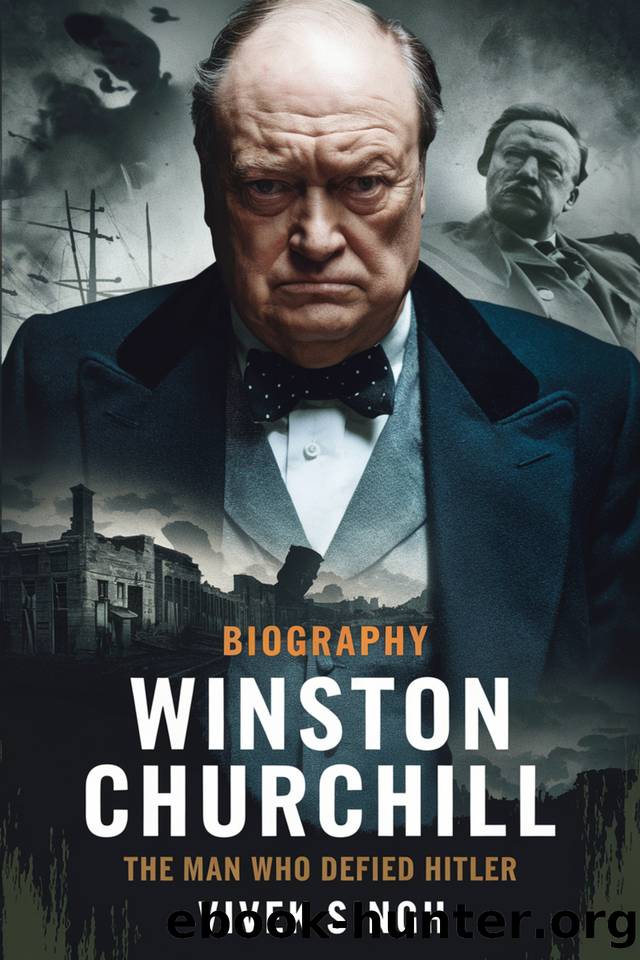Winston Churchill: The Man Who Defied Hitler by SINGH VIVEK

Author:SINGH, VIVEK
Language: eng
Format: epub
Publisher: UNKNOWN
Published: 2024-10-08T00:00:00+00:00
The Grand Alliance: Roosevelt, Churchill, and Stalin
The formation of the Grand Alliance during World War II marked a crucial turning point in the fight against Nazi Germany. Comprised of the United States, the United Kingdom, and the Soviet Union, this coalition brought together three distinct powers, each with its own interests, ideologies, and goals. Despite their differences, Franklin D. Roosevelt, Winston Churchill, and Joseph Stalin recognized the necessity of cooperation in the face of a common enemy. The dynamics of their relationships, the key conferences that shaped their strategies, and the complexities of their cooperation significantly influenced the outcome of the war.
The Relationship with Franklin D. Roosevelt
Winston Churchillâs relationship with Franklin D. Roosevelt was one of the most significant partnerships of World War II. Their bond was rooted in mutual respect and a shared commitment to defeating Nazi Germany. Churchill admired Rooseveltâs leadership and ability to inspire the American public, while Roosevelt recognized Churchill's resolve and determination to fight against tyranny.
Churchill and Roosevelt first established their working relationship during the early years of the war. Following Churchillâs appointment as Prime Minister in 1940, the two leaders communicated regularly through letters and personal meetings. Their connection deepened during Churchillâs visits to the United States, where he sought to persuade Roosevelt to increase American support for Britain.
One of the pivotal moments in their relationship came with the signing of the Atlantic Charter in August 1941. This agreement outlined the shared goals of the United States and Britain, including the commitment to democracy, economic cooperation, and the desire to ensure a post-war world free from tyranny. The Atlantic Charter laid the foundation for future collaboration and symbolized the unity of purpose between the two nations.
Rooseveltâs decision to support Britain through the Lend-Lease Act in 1941 further solidified their alliance. This act allowed the United States to provide military aid to Britain, ensuring that the British war effort could continue despite severe resource shortages. Churchill understood the importance of American support, recognizing that it was crucial for Britainâs survival and the eventual defeat of Nazi Germany. The bond between the two leaders was not merely one of necessity but also one of friendship and trust, which would be vital in the years to come.
Tensions and Cooperation with Joseph Stalin
The relationship between Churchill and Joseph Stalin was markedly different from that with Roosevelt. While both leaders recognized the necessity of cooperation, their ideological differences and mutual distrust created tensions that complicated their alliance. Stalin, the leader of the Soviet Union, represented a totalitarian regime that stood in stark contrast to the democratic ideals championed by Churchill and Roosevelt.
Despite these differences, Churchill understood that defeating Nazi Germany required collaboration with the Soviets. The initial phase of the war saw the rapid advance of German forces into Soviet territory, culminating in the invasion of the Soviet Union in June 1941. The dire situation faced by Stalin compelled him to seek assistance from the Western Allies, creating a context for cooperation.
Churchill's willingness to engage with Stalin was evident in his diplomatic approach.
Download
This site does not store any files on its server. We only index and link to content provided by other sites. Please contact the content providers to delete copyright contents if any and email us, we'll remove relevant links or contents immediately.
| Military | Political |
| Presidents & Heads of State | Religious |
| Rich & Famous | Royalty |
| Social Activists |
Waking Up in Heaven: A True Story of Brokenness, Heaven, and Life Again by McVea Crystal & Tresniowski Alex(37808)
Empire of the Sikhs by Patwant Singh(23084)
We're Going to Need More Wine by Gabrielle Union(19045)
Hans Sturm: A Soldier's Odyssey on the Eastern Front by Gordon Williamson(18590)
Leonardo da Vinci by Walter Isaacson(13336)
The Radium Girls by Kate Moore(12028)
Tools of Titans by Timothy Ferriss(8393)
Educated by Tara Westover(8053)
How to Be a Bawse: A Guide to Conquering Life by Lilly Singh(7486)
Permanent Record by Edward Snowden(5846)
The Last Black Unicorn by Tiffany Haddish(5635)
The Rise and Fall of Senator Joe McCarthy by James Cross Giblin(5280)
Promise Me, Dad by Joe Biden(5153)
The Wind in My Hair by Masih Alinejad(5095)
A Higher Loyalty: Truth, Lies, and Leadership by James Comey(4960)
The Crown by Robert Lacey(4814)
The Iron Duke by The Iron Duke(4354)
Joan of Arc by Mary Gordon(4109)
Stalin by Stephen Kotkin(3965)
